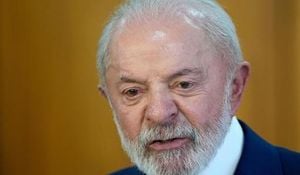The Pentagon, the seat of America’s military might, has long been a symbol of both national security and the democratic ideal of transparency. But as of September 19, 2025, that balance has shifted dramatically. In a move that’s stirred up a hornet’s nest among journalists and press freedom advocates, the Pentagon issued a sweeping 17-page memo mandating that credentialed journalists sign a pledge not to report any information that hasn’t been explicitly authorized for release—even if that information isn’t classified. The consequences for stepping out of line? Loss of the coveted credentials that grant access to the Pentagon’s corridors.
The memo, released by the recently renamed US Department of War (formerly the Department of Defense, a change instituted under President Donald Trump’s administration), spells out the new rules in no uncertain terms. According to the directive, “Information must be approved for public release by an appropriate authorizing official before it is released, even if it is unclassified.” For journalists who have spent years navigating the Pentagon’s labyrinthine halls, this marks an abrupt and jarring change.
Defense Secretary Pete Hegseth, a former Fox News personality, didn’t mince words when he took to social media to trumpet the new restrictions. “The ‘press’ does not run the Pentagon — the people do. The press is no longer allowed to roam the halls of a secure facility,” Hegseth wrote, adding, “Wear a badge and follow the rules — or go home.” His message was clear: the era of open press access at the Pentagon is over, at least for now.
These new restrictions don’t exist in a vacuum. They come on the heels of a series of embarrassing leaks that rattled the Pentagon’s leadership earlier in the year. One particularly awkward episode unfolded when Jeffrey Goldberg, editor-in-chief of The Atlantic, was mistakenly included in a Signal messaging group where Hegseth and other officials discussed plans for potential military strikes in Yemen. The fallout was swift: Mike Waltz, then Trump’s national security adviser, took responsibility for the slip-up and was promptly reassigned.
Another incident involved a leak to The New York Times about a planned Pentagon briefing for billionaire Elon Musk regarding U.S. military contingency plans should war erupt with China. President Trump, upon learning of the leak, canceled the briefing and Hegseth suspended two Pentagon officials as an investigation got underway. These episodes, according to sources cited by both The Associated Press and The Washington Post, contributed to a climate of heightened suspicion and a clampdown on media access.
Throughout 2025, the Pentagon has systematically evicted numerous news organizations from its premises and imposed an ever-tightening series of restrictions. Reporters are now banned from accessing large swaths of the building unless accompanied by a government escort—areas that, in previous administrations, were open to the press as part of routine coverage of the world’s most powerful military. The new policy, critics say, is a sharp departure from the Pentagon’s historical approach to press relations.
Press freedom advocates have been quick and vocal in their condemnation. Mike Balsamo, president of the National Press Club and national law enforcement editor at The Associated Press, minced no words: “If the news about our military must first be approved by the government, then the public is no longer getting independent reporting. It is getting only what officials want them to see. That should alarm every American.” His remarks, widely circulated in the press, capture the sense of urgency and concern felt across the journalism community.
The Society of Professional Journalists echoed these sentiments in a statement released on September 20, 2025, calling the Pentagon’s move “alarming.” The organization warned, “This policy reeks of prior restraint — the most egregious violation of press freedom under the First Amendment — and is a dangerous step toward government censorship. Attempts to silence the press under the guise of ‘security’ are part of a disturbing pattern of growing government hostility toward transparency and democratic norms.” The SPJ’s statement, reported by several outlets, underscores the broader fear that these new rules could set a precedent for other government agencies.
Matt Murray, executive editor of The Washington Post, added his voice to the chorus of criticism in a column published on September 20. “The Constitution protects the right to report on the activities of democratically elected and appointed government officials,” Murray wrote. “Any attempt to control messaging and curb access by the government is counter to the First Amendment and against the public interest.” For Murray and many of his peers, the Pentagon’s new policy is more than a bureaucratic hurdle—it’s a fundamental challenge to the role of a free press in American democracy.
The rationale from the Pentagon’s side is rooted in recent security lapses and a desire to reassert control over sensitive information. With high-profile leaks making headlines and embarrassing top officials, the impulse to tighten the spigot is understandable, at least from a security standpoint. But critics argue that the pendulum has swung too far, endangering the public’s right to know and undermining the accountability that comes from independent reporting.
The broader context is hard to ignore. President Trump’s administration has, over the past year, ramped up threats, lawsuits, and other forms of pressure aimed at reshaping the American media landscape. The Pentagon’s policy, according to observers, fits into this larger pattern of government efforts to manage and sometimes muzzle the flow of information. The renaming of the Department of Defense to the Department of War—a symbolic but telling change—signals a more aggressive posture not just in military affairs but in the relationship between government and the press.
For many journalists, the new pledge feels like a line in the sand. The requirement to refrain from reporting even unclassified information unless it’s been officially cleared raises thorny questions about the future of investigative journalism in the national security sphere. Will reporters risk their credentials—and their livelihoods—to break stories that officials would rather keep under wraps? Or will the chilling effect of these new rules stifle the kind of probing, independent journalism that has long been a hallmark of American democracy?
As the dust settles, one thing is clear: the battle lines over press freedom and government transparency are being redrawn in real time. The Pentagon’s new policy is already reverberating far beyond the walls of the military headquarters, sparking debate among lawmakers, legal experts, and ordinary citizens about where the line should be drawn between security and the public’s right to know. With the First Amendment at stake, it’s a debate that’s unlikely to fade from the headlines any time soon.
For now, journalists covering the Pentagon face a stark new reality, one in which every word and every story must pass through a government filter. Whether this marks a temporary tightening or a lasting transformation remains to be seen, but the implications for American democracy—and for the world’s understanding of how the U.S. military operates—are profound.




